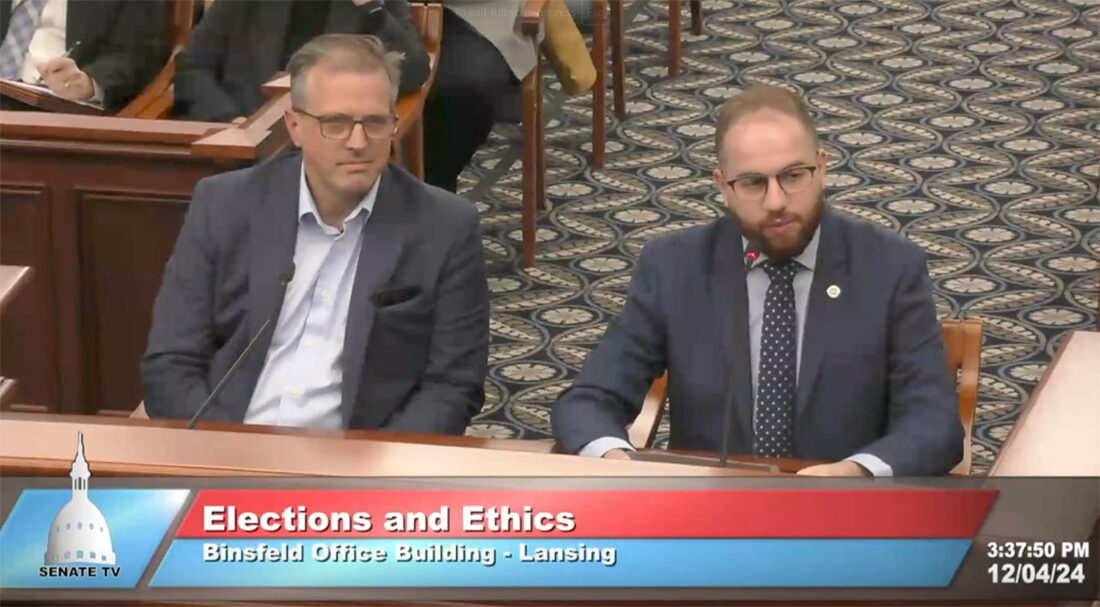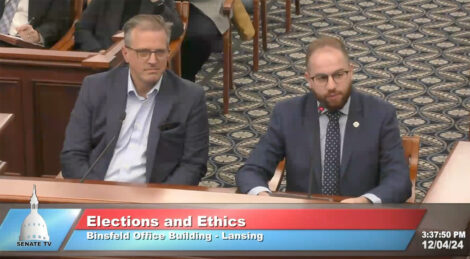Michigan Senate passes reforms on collecting petition signatures
- The chambers of the Michigan Senate in Lansing. (Susan J. Demas | Michigan Advance)
- State Sens. Jeff Irwin, D-Ann Arbor, and Jeremy Moss, D-Southfield, testify in December 2024 in support of legislation to reform the petition process in Michigan. (Screenshot via Michigan Advance)

The chambers of the Michigan Senate in Lansing. (Susan J. Demas | Michigan Advance)
The fight against election disinformation and changes to Michigan’s petition circulation process cleared the upper chamber of the state Legislature on Thursday.
Senators moved the legislative package with bipartisan support.
Among the bills were Senate Bill 529, Senate Bill 530 and Senate Bill 531, sponsored by Democratic state Sens. Jeremy Moss of Bloomfield Township and Jeff Irwin of Ann Arbor.
The Irwin-Moss bills would ban petition organizers from paying circulators per signature, joining other states that have banned financial incentives for circulators to lie to voters for support; require circulators to direct potential signers to a factual summary of the ballot proposal’s contents and purpose before collecting their signature; and ensure that only one signature is counted if two identical signatures appear on a single petition.
“Every election cycle, we hear reports of petition circulators engaging in deceptive practices that erode faith in the process to place candidates and proposals on the ballot. A person should be able to grow support for their cause based on its own merit, not by misrepresenting what the petitions will do,” Moss said in a statement. “We must set up the safeguards needed to ensure voters can participate in an effective and trustworthy process to help shape the future of our state.”

State Sens. Jeff Irwin, D-Ann Arbor, and Jeremy Moss, D-Southfield, testify in December 2024 in support of legislation to reform the petition process in Michigan. (Screenshot via Michigan Advance)
Irwin, in a statement, said that when citizens participate in direct democracy, they should know that their signatures were counted as valid and not thrown out in the screening process.
“Michigan has a lively democracy that produces a lot of initiative petitions, and it can be hard for even the most informed voter to keep track of whether they have already signed a particular version of a petition,” Irwin said. “Multiple signatures from the same person are all thrown out under current law, disenfranchising citizens. My bill has a simple solution: if a person signs more than once, one and only one signature would be counted. Senate Bill 531 would give citizens the confidence to sign petitions they support without fear that they might run afoul of the law or inadvertently invalidate their own signature.”
The package also includes Senate Bill 533, which passed earlier this year and was sponsored by Democratic state Sen. Mary Cavanagh of Redford Township.
Cavanagh’s bill would ban false statements or misrepresentations concerning elections, ensuring that bad actors would be fined and penalized.
“As someone who has been an election worker, I have witnessed firsthand the detrimental impacts that election disinformation can have on our democracy,” Cavanagh said in a statement. “In recent years, we have witnessed targeted disinformation campaigns within some of the most underserved communities in our state, like posting signs telling folks that polling places are closed or disingenuous robocalls with false election information aimed at restricting Michiganders’ right to vote.”
Michigan Secretary of State Jocelyn Benson and Attorney General Dana Nessel both praised the passage of the legislation.
“Petitions are meant to reflect the will of the people. But too many candidates and bad actors have manipulated our state’s petition circulation process for their own financial or political gain,” Benson said in a statement. “These bills will ban financial incentives to generate fraudulent signatures on petitions and require that circulators provide a factual summary of the proposal’s contents. Michigan voters deserve to know the truth about what they’re being asked to sign, and these bills ensure they will get it.”
Nessel, in a statement, said the voters deserve confidence, fairness and security in their election systems.
“The improvements outlined in this package will help encourage civic engagement statewide, while closing a loophole in our current statute which we have seen bad actors misuse for their fraudulent aims,” Nessel said. “I applaud the Senate for advancing this vital legislation and will continue my advocacy for its passage as it moves to the House.”
Although the Republican-controlled House has been a proponent of election integrity and new security measures, it remains unclear if they will go for the largely Democratic-led Senate package.
The Irwin-Moss bills were referred to the House Election Integrity Committee after passage on Thursday, but Cavanagh’s bill was referred to the House Government Operations Committee when it passed the Senate in September – a committee known in Lansing as the place where legislation goes to die. The latter committee has yet to hold a hearing on Cavanagh’s bill.
Earmark transparency bills also pass
Meanwhile, the Senate also passed legislation creating a 45-day window for new legislative earmarks before they can come up for a vote in the upper chamber.
The bills – Senate Bill 596 and House Bill 4420 – passed unanimously.
Senators were volleying between a shorter 10-day window and a 60-day window proposed by state Sen. Jim Runestad of White Lake, also the chair of the Michigan Republican Party.
GOP House Speaker Matt Hall of Richland Township also previously said he would not entertain any Senate version of earmarks reform, which had its roots this year to changes in House rules and the protracted budget fight, without a long period to dissect where the earmarks were going and who would benefit from them.
But the House unanimously concurred with the measure on Thursday.
———
Michigan Advance is part of States Newsroom, a national 501(c)(3) nonprofit. For more, go to https://michiganadvance.com.







